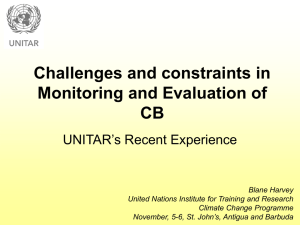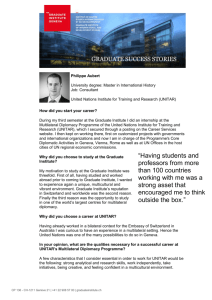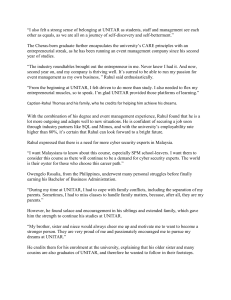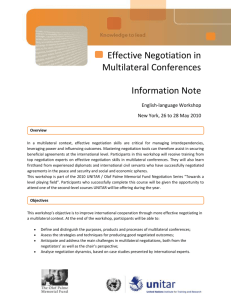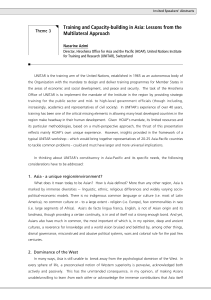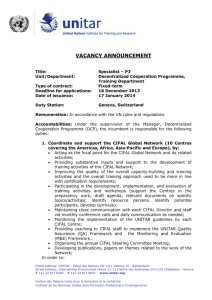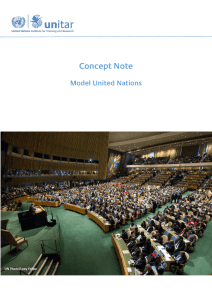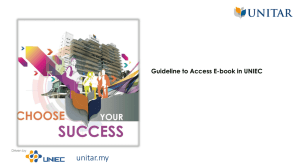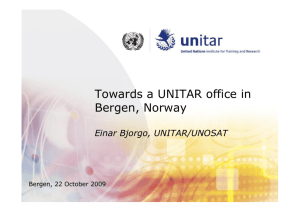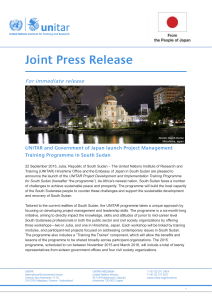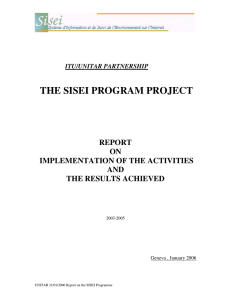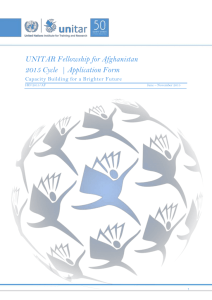e-Learning @ unitar
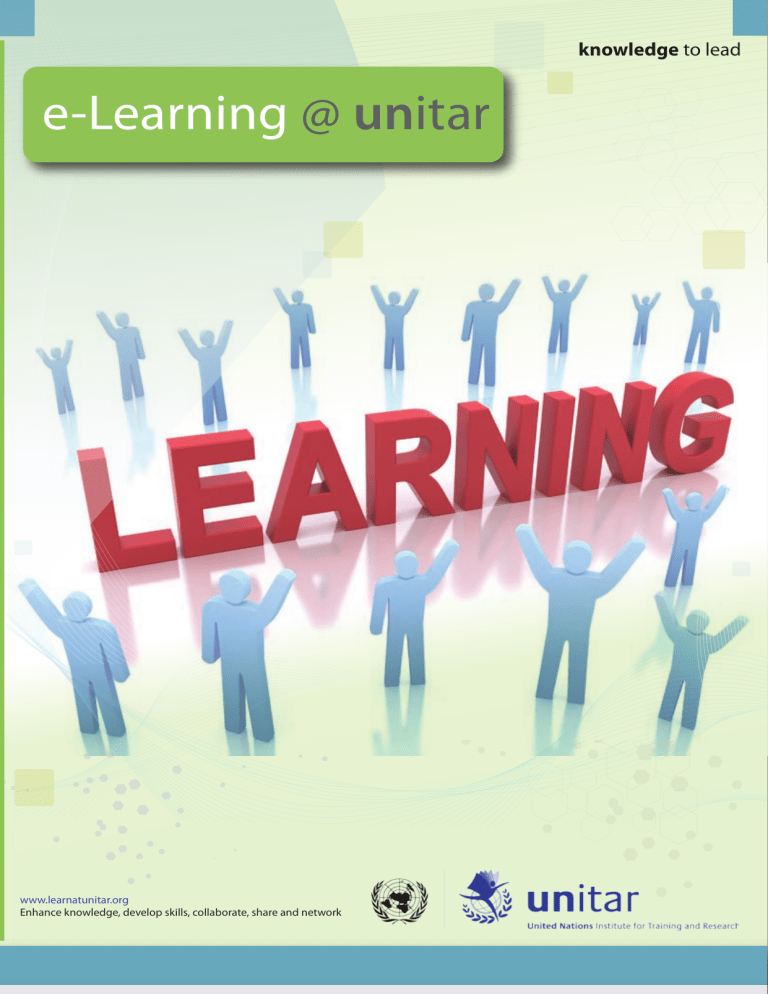
e-Learning
@ un itar
knowledge to lead
www.learnatunitar.org
Enhance knowledge, develop skills, collaborate, share and network
knowledge to lead
e-Learning @
un itar
The United Nations Institute for Training and Research has close to a decade of experience on e-Learning or technology-enhanced learning activities. It started offering a number of courses in the field of public finance and trade. As demand increased, it expanded its catalogue adding courses on multilateral diplomacy, environmental law, and intellectual property law.
Technology-enhanced learning activities continue to grow at UNITAR, as established in its Strategic Plan 2010-2012. In 2010 the Institute delivered over
170 courses, expanding language coverage and new subjects areas such as peacekeeping, ICT skills, sustainable urbanization, and knowledge management.
The expansion of online courses also supports UNITAR’s commitment to the
United Nations carbon-neutrality policy. This delivery modality reduces CO
2 emissions associated to the Institute’s training activities.
Technology for Learning
According to the Plan of Action of the World Summit on Information Society, the Institute is broadening the scope of its training activities, taking full advantage of the potentialities created by information communication technologies to increase its outreach.
UNITAR utilizes Moodle platform to deliver its online activities. Moodle’s constructivist learning approach aligns with the Institute’s methodologies, for the design, development, and implementation of training activities.
www.learnatunitar.org
Methodological Approach
The Institute adopts instructional design methods that valorize experiential and collaborative learning to develop just-in-time skills of adult learners.
It caters for personal learning styles that favor non-linear learning paths through multiple-instructional settings, including blended learning.
Social activities support the learning process to facilitate networking and encourage knowledge sharing.
The range of courses offered vary in thematic topics, duration, design, tools adopted, and types of learning activities, but they share unique methodologies that support and facilitate the achievement of learning objectives for continuous professional development.
e-Learning @
un itar
knowledge to lead
Multilateral Diplomacy
Practical skills and specialized knowledge for efficient and effective decision-making in the bilateral and multilateral arena.
Diplomats, governmental officials and other professionals working in international settings can strengthen their capacity in mediation and negotiation, UN protocol, multilateral conferences, and climate change diplomacy.
Public Finance and Trade
A range of courses to address challenges on financial management, capital market development, financial negotiation, debt management, financial governance, trade, and intellectual property.
Finance and trade officials from various sectors enhance knowledge, develop professional skills, and network while interacting with renowned experts.
International Law
Comprehensive understanding of universal conventions and advanced knowledge of multilateral environmental agreements to enable the implementation of international obligations at the national level.
Civil servants, practitioners, diplomats, and academics strengthen knowledge of principles of law, treaty-making process, and implementation and compliance.
Peacekeeping
A series of basic and advanced courses to enhance the capacities of civilians, military and police personnel to serve in peace operations.
Introduction to peace operations, conflict analysis and resolution, protection of civilians, and transitional justice are some of the courses offered.
Knowledge Systems
Series of courses on knowledge sharing tools and techniques and
Web 2.0 for development.
The inaugural course on social media tools, social networking, collaboration, and knowledge exchange enables development professionals to use the potential of social media to enhance projects’ efficiency, increase outreach, and improve work effectiveness.
Sustainable Urbanization
Analytical tools and skills to enable local leaders, decision-makers, urban planners, and other professionals to balance quality of life, productivity and urban communities’ needs.
Courses in sanitation and mobility provide knowledge and experience sharing in urban services, enhancing the ability of city managers to deal with the challenges of cities’ growth.
Quality Assurance
The enhancement of the quality of products and services is one of
UNITAR’s strategic priorities. The implementation of quality assurance mechanisms considers the identification and adoption of quality standards aligned with the activities developed by the Institute and in accordance with the delivery modalities utilized.
In 2008 the Institute integrated a multi-agency process to develop a set of quality criteria and certification process for technology-enhanced learning activities in the field of international capacity building – the Open
ECBCheck. This set of criteria supports capacity building organizations to measure the quality of their courses through peer review, with attribution of quality label certificates.
UNITAR participates in the group of institutions supporting the development and further enhancement of the Open ECBCheck. In 2010, the “Governance in Urban Sanitation” cource received the ECBCheck quality certificate, becoming the first UNITAR course to achieve international certification. The Institute continues to work to have other courses certified.
Partnerships
The Institute works in partnership with a number of institutions to implement various e-Learning courses.
These partnerships build upon materials and/or expertise to:
• Develop new courses, customizing off-the-shelf
materials for online delivery;
• Raise the level of cognition of existing courses,
adding new instructional components;
• Jointly implement specialized courses.
UNITAR will continue strengthening partnerships to implement and deliver e-Learning courses, expanding its alliances to better serve its beneficiaries.
